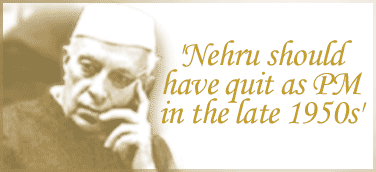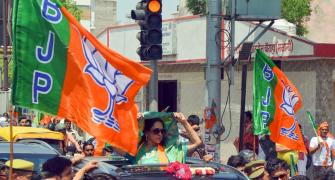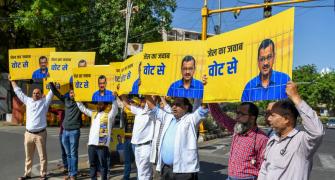
Forty years ago, India's first prime minister passed into the ages.
To mark his 40th death anniversary, rediff.com has launched a special series to evaluate Jawaharlal Nehru's legacy.
Earlier in this series:
Brahma Chellaney: India, the lamb state
Lt Gen Eric A Vas: Truly, an extraordinary fellow
Today, Professor Judith M Brown, author of the recent biography, Nehru: A Political Life, shares her insights in a candid e-mail interview with Deputy Managing Editor Amberish K Diwanji.
Brown is Beit Professor of the History of the British Commonwealth at Balliol College, Oxford. According to the Oxford University web site, Professor Brown's main interests are 19th and 20th century Indian history and politics, South Asian migration, modern Hinduism, and gender and imperialism. Among her books are Gandhi: Prisoner of Hope and Modern India: The Origins of an Asian Democracy.
What got you interested in Nehru?
I first got interested in Nehru through my earlier work on Gandhi. The relationship between the two was clearly vital to them both and to the nationalist movement. Then, with a view to the upcoming 40th anniversary of Nehru's death, Yale University Press asked me if I would write a biographical study, which would be more than a biography and would discuss him in the context of his times and his contribution to those times.
On a personal level Nehru is fascinating to someone from a British background because he moved so easily between the worlds of India and Britain at a time when comparatively few Indians did so.
In India, Nehru's legacy is seen in black or white, rarely gray. How do you assess his legacy?
I think legacy is the wrong word as it suggests handing on goods to a succeeding generation. I prefer to think of Nehru as someone who helped to ensure the deep rooting of fundamental values in the Indian polity, and who tried to work out ways in which these could be expressed. Each generation has to do that working out in its own context rather than 'inheriting' things, institutions etc.
What, in your opinion, is his single greatest positive influence? And his single greatest failure?
His most positive influence and what he valued most of all was the attempted construction of a plural, open, and democratic polity working for change in the lives of all citizens. He used to speak of India as a composite nation, and of the ground-breaking experiment of trying to achieve socio-economic change by democratic processes and consent in contrast to state-directed revolution with its risk of profound violence.
I think his greatest failure in the domestic sphere was the failure to make mass education a priority.
You have written that Nehru appeared insensitive to the concerns and fears of the Hindus. What should he have done differently? Was this the beginning of the rise of the Hindu right?
There was always a Hindu strand in the politics of the Congress going back to the 1920s or even earlier. So Nehru did not 'cause' this tendency. I think he found it very difficult to talk in the language of people who were attracted to this tendency and so failed to engaged with them meaningfully -- as perhaps Gandhi and Patel did in very different ways. But you must remember that he endured the horrors of Partition and was convinced that India must prioritise the establishment of a polity in which sizeable minorities were safe and made welcome citizens: otherwise India would be no different in essence from the new Pakistan.
Why is Nehru hated so much nowadays by so many Indians? The Hindu right is particularly anti-Nehru, blaming him for the Kashmir problem, and for stifling the economy.
I think the Hindu right hate his idea of a 'composite nation' rather than a nation rooted in Hinduism -- and Kashmir is symptomatic of this.
On the economic front they, like many others, think unhistorically. They blame him for the burden of the 'licence-permit raj', forgetting that in the early 1950s the great challenge of economic development was intimately linked to genuine political independence and Nehru's generation felt (as did all their contemporaries worldwide) that State intervention was the only way to get stuck into major economic development -- witness Britain's post-war economic reconstruction as well as Communist patterns of development. You could argue that the problems lay in the late 1960s and 1970s when the groundwork had been laid for development and the State could have stood back.
What pushed Nehru so strongly towards the licence-permit raj and Socialist planning?
As I have said, serious investment in national economic development and restructuring was considered in the 1950s by many economists to be the only reliable way of kick-starting a backward or damaged economy. Further, only the State could mobilise the resources to build the necessary infrastructure. See Great Britain after the War as well as Soviet Russia or China. The problem lay with India holding on to this strategy up to the 1980s.
On the Socialist side, you have to remember that a major critique by the nationalists was that the British did nothing for the poor, backed the large landlords, princes, etc, so virtually all nationalists subscribed to the rhetoric of enabling those at the base of society to enjoy the fruits of independence. Gandhi and Nehru both believed this passionately in their own ways, though Gandhi opposed the idea of modernisation of the economy as the route to helping the poor.
Nehru and most of his contemporaries believed that only large-scale industrialisation could really change the economy and enable India to be a player on the world stage as well as helping its own citizens. Hence the rhetoric (but limited policy) under Nehru of producing enough national wealth so that some could 'trickle down' to those at the base of society. Nehru had a major problem with many in Congress who subscribed to the rhetoric, but did not want serious structural change in society -- see his problems with land reform in the 1950s. Nehru was a genuine Socialist of a sort, but argued that India had to find its own distinctive Socialist path and could not adopt European or Russian patterns.
In allowing rights and privileges to the Muslims as a community, did Nehru fail in placing the Individual (Muslim women) above the community? Did he freeze Muslim reforms by letting the orthodox segments of the Muslim community gain control over the community?
I think one should not fall into the trap of thinking that he could control all policies and events. He was not able to call the tune over reform of Hindu law and had to give up the Hindu Code Bill, for example. In relation to minorities (Christians and Muslims), I think he felt that majority meddling with their personal law would be undesirable -- even if possible -- at this juncture. (See my answer to the fourth question.)
A real problem for Indian Muslims and the Indian polity has been the lack of modern, articulate Muslim leaders in politics who could tackle this problem of reforming personal law. It goes back to the fact that so many of these potential leaders became Pakistanis, and since then there have been few breeding grounds for such an articulate leadership in India, thus playing into the hands of conservative religious leaders. It is a worldwide problem these days who has the authority to speak for Muslims?
Why did Gandhi prefer Nehru over Patel as India's first prime minister? In retrospect, was the decision flawed?
Nehru was a far more international figure, and a pan-Indian rather than a regional figure, and someone able to fashion dialogue across more of the political spectrum. This had been a strong element in Gandhi's nurturing of Nehru for leadership since the 1920s. I think Gandhi felt that the two complemented each other in their skills -- as indeed was the case.
What made Nehru commit such cardinal mistakes in his dealing with China? Why was it such a blind spot?
Nehru had been convinced since the 1920s that India and China were natural allies in the rejuvenation of Asia, both domestically and in world politics. At the intellectual level he could not bring himself to recognise that Communists might be imperialists and belligerents. At the practical level of governance the problem lay in the fact that he a. was his own foreign minister and b. there was no powerful counterweight of an external affairs establishment or minister to challenge his views. Further, Indian 'intelligence' was very weak on what was happening in China.
Should not Nehru have made way for another PM after 1957? Was he not wrong in sticking to office till the end?
Yes, I think he should have given up some time in the late 1950s.
You have written about Nehru's frustration in bringing about social change. What could he have done differently? What should he have done to give India a better social structure?
Education is key here and it was not made a priority; neither was population control. The government did not realise the growth rate until just before the 1961 census. The rapid growth rate meant that the scarce resources for investing in major social change had to spread even more thinly. As he said, India had to run to stand still.
How much of India today reflects Nehru's imagination?
The idea that India is India -- that is, a nation. Also the profound rooting of democracy in India. Also the rhetoric of a nation which must care for all its citizens -- even if the reality is often lacking.
It is often said that India remains a democracy because of Nehru. But was it that given his awesome stature, Nehru could keep India democratic because he never faced any threat to his position?
India is a democracy because of the deep commitment of its citizens to democracy -- not because of Nehru himself. He worked within democratic structures and helped to nurture them in many ways, but he was not their author and I think that if he had challenged them at any point he would have been thrown out. His generation and younger people brought up in the colonial time valued democracy as a cardinal value for a free India because of their experience of being British subjects without the full rights of British subjects under an imperial regime.
As a person, what were his weaknesses that would affect India's destiny?
His inability to delegate -- gathering so much power to his own person as prime minister that he stifled opposition and failed to nurture those who might have challenged him. This became disastrously clear over foreign policy and also at the end when he could not let go and government virtually ground to a halt.
Any little-known fact of Nehru's life that you might want to tell readers?
I don't think so. There are lots of lovely incidents and stories in the book if you want to use them. For example, his experience within his own family of the power of Hindu conservatism against women -- the problems of his widowed sister and how this, I am sure, goaded him on to try to reform the position of Indian women. Or the 'domestic' Nehru who loved to buy presents for his grandsons and daughter on foreign trips.
Earlier in this series:
Brahma Chellaney: India, the lamb state
Lt Gen Eric A Vas: Truly, an extraordinary fellow
Image: Uday Kuckian








